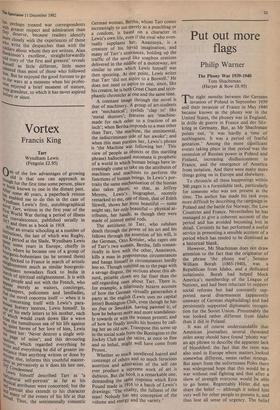Vortex
Francis King
Tarr Wyndham Lewis (Penguin £2.95)
One of the few advantages of growing th old is that one can approach as or°,411 for the first time some person, place k-f,v°01( known to one in the distant past. h ler some 40 years, a paperback reissue \vas enabled me to do this in the case of ot?,,hdham Lewis's first, autobiographical Tarr, written in the first year of the kn'dst World War during a period of illness 19;.," convalescence, published serially in arid then as a book in 1918. inA:fter an erratic schooling at a number of kciltutions, the last of which was Rugby, a Period at the Slade, Wyndham Lewis some e years in Europe, chiefly n (--11"s, where he became one of a group of mittrgeois-bohemians (as he termed them) eoLlocked to France in search of artistic b hrtenment much as similar bourgeois- rea%;111, ians nowadays flock to India in th,`" of spiritual enlightenment. It is with ap-he People and not with the French, who sh0r merely as waiters, concierges, thaTceepers, policemen and landladies, 11; the novel concerns itself — when it is oh.: concerning itself with Lewis's para- ot;:hnt literary interest, Lewis himself. In of` °f his early letters to his mother, each fr Which , would crash down like a wave 11°,211 toe tumultuous sea of his life against cjniet haven of her love of him, Lewis rehj°1ned her: 'Never destroy a single writ- eg(;,,Page of mine'; and this devouring ver-o`Istn, which regarded everythinghe i Dor:: and everything he did of greater m- ao, nee than anything written or done by oie'l3rle else, informs this youthful master- Seice as pervasively as it does his late one, if.teondemned. wis himself described Tarr as 'a ph c.aturai self-portrait' as far as his selpteal attributes were concerned; but the self. al also extends to his character lieri,112,anY of the events of his life at that
Thus, the sentimentally romantic
German woman, Bertha, whom Tarr comes increasingly to use merely as a punchbag or a condom, is based, on a character in Lewis's own life, even if the rival who even- tually supplants her, Anastasya, is a creature of his fervid imagination; and many of Tarr's utterances, holding up the traffic of the novel like soapbox orations delivered in the middle of a motorway, are similar to ones which Lewis himself was then spouting. At one point, Lewis writes that Tarr 'did not aspire to a Boswell.' He does not need to aspire to one, since, like his creator, he is both Great Cham and syco- phantic chronicler at one and the same time.
A constant image through the novel is that of machinery. A group of art-students are 'mechanical'; eyelids 'clap to' like 'metal shutters'; features are 'machine- made for each other to a fraction of an inch'; when Bertha responds to a man other than Tarr, 'the machine, the sentimental, the indiscriminate side of her awoke'; and when this man pursues her, Lewis's phrase is 'the Machine was following her.' This view of people as objects or (his startling phrase) hallucinated automata is prophetic of a world in which human beings have in- creasingly come to take on the attributes of machines and machines to perform the functions of human beings. In Lewis's por- traits the same mechanisation of the human also takes places, so that, as Jeffrey Meyers, Lewis's biographer, recently remarked to me, one of them, that of Edith Sitwell, shows her most beautiful — some might say, her only beautiful — physical at- tributes, her hands, as though they were made of jointed metal rods.
The antithesis to Tarr, who subdues death through the power of his art and his fellows through the assertion of his will, is the German, Otto Kreisler, who rapes one of Tarr's two women, Bertha, falls roman- tically in love with the other, Anastasya, kills a man in preposterous circumstances and hangs himself in circumstances hardly less so. Though vomited on to the page with a savage disgust, the sections about this ab- surd, pitiable clown are far finer than the self-regarding ones about Tarr. There is, for example, a hilariously bizarre account of how the German virtually gatecrashes a party at the english (Lewis uses no capital letter) Bonington Club, even though he has no frac or Smokkin, having pawned it; of how he behaves more and more scandalous- ly towards or with the women present; and of how he finally insults his hostess by call- ing her an old sow. Transpose this scene up in the social scale from the Bonington to the Jockey Club and the satire, at once so fine and so lethal, might well have come from Proust.
Whether so much unrelieved hatred and contempt of others and so much ferocious assertion and admiration of the self can ever produce a supreme work of art is dubious. But the book is a remarkable one, demanding the same response which Ezra Pound made in 1916 to a batch of Lewis's 31, the fullness of the drawings: 'The vitality,
man! Nobody has any conception of the volume and energy and the variety.'










































 Previous page
Previous page